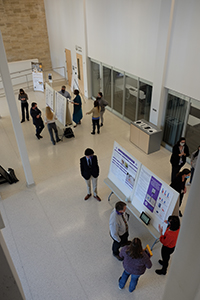March 12, 2021
College of Veterinary Medicine hosts annual Phi Zeta Research Day
Submitted by Natalia Cernicchiaro

Phi Zeta Research Day represents an opportunity for the College of Veterinary Medicine community to come together and share the latest research in all fields of basic, applied and clinical sciences. Celebrated on Tuesday, March 2, the event was offered in a hybrid format, combining in-person attendance with a virtual component. Several attendees, including students and faculty from Manhattan and Olathe campuses, were able to join the sessions remotely.
The event is organized by the Sigma chapter of the Society of Phi Zeta, a professional honors society whose name is based on the Latin word philozoi, which means "love for animals." The chapter's mission is to recognize and promote excellence in academic scholarship and research that improves the health and welfare of animals.
Phi Zeta Research Day began with a keynote address by Molly McCue, associate dean for research and professor of equine internal medicine at the University of Minnesota's College of Veterinary Medicine. McCue is recognized as a global leader in equine genomics and computational biology. Her keynote address was "A journey in comparative genomics inspired by clinical questions and life's challenges."
"Dr. McCue's keynote speech explored her two-decades journey utilizing state-of-the-art molecular genetics and genomic tools to study complex genetic diseases in horses," said Natalia Cernicchiaro, assistant professor of veterinary epidemiology at K-State and president of Phi Zeta. "Dr. McCue's presentation was a testament of how tenacity, purpose, and life's challenges, can drive incredibly meaningful research pursuits, as demonstrated by of one of her latest projects investigating behavioral traits in dogs that are predictive of their training success as service dogs of individuals on the autism spectrum disorder."
The keynote was followed by oral research presentations, and a poster session by veterinary, graduate and postgraduate researchers in the K-State College of Veterinary Medicine.
"This year it was extremely stimulating to showcase all the research developed in response to the SARS-CoV-2 virus, emerging and transboundary diseases, clinical diagnosis and treatment of diseases in small, exotic and large animal species, as well as research on animal health, and welfare, that is been conducted by students and staff in our college," Cernicchiaro said.
The following is a list of Phi Zeta Research Day award recipients.
Basic Science — oral presentations:
First place — MaRyka Smith, doctoral student in pathobiology, for "Evaluating the value of rapid and accurate traceability in the control of foot-and-mouth disease outbreaks in the U.S."
Second place — Maddie Butterfield, second-year veterinary student, for "Investigation of virus evolution in SARS-CoV-2 clinical samples from experimentally infected cats."
Third place — Taeyong Kwon, doctoral student in pathobiology, for "Environmental stability of SARS-CoV-2 on different types of surfaces under indoor and seasonal climate conditions."
Applied/Clinical Science, Small animal/exotics — oral presentations:
First place — Lauren Aldrich, resident, small animal surgery, for "Comparison of plasma tramadol concentration after single-dose oral and transdermal administration in cats."
Second place — Marissa Komp, second-year veterinary student, for "A pilot study of pain assessment and activity tracking in dogs undergoing radiation therapy."
Third place — Tess Rooney, intern, zoological medicine, for "Evaluation of dexmedetomidine-ketamine-midazolam combination administered intramuscularly in captive ornate box turtles (Terrapene ornata ornata)."
Applied/Clinical Science, Large Animals — oral presentations:
First place — Miriam Martin, doctoral student in anatomy and physiology, for "Comparative pharmacokinetics of flunixin meglumine and meloxicam in tilapia (Oreochromis spp.)."
Second place — Maria Lou, doctoral student in anatomy and physiology, for "Evaluating the utility of a CO2 surgical laser for piglet tail docking to reduce pain and improve wound healing."
Third place — Cierra Roubicek, second-year veterinary student, for "Evaluation of antimicrobial activities of phytophenols against bacterial pathogens that cause liver abscesses in feedlot cattle."
Poster presentations:
First place — Alyssa Toillion, doctoral student in pathobiology, for "Effect of protracted free-choice CTC-medicated mineral for anaplasmosis control on the antimicrobial resistance profile of Escherichia coli in beef cattle on a pasture setting."
Second place — Macy Flowers, master’s student in biomedical sciences, for "Evaluation of enrofloxacin and oxytetracycline to eliminate persistent Anaplasma marginale infection in cattle."
Third place — Shanice Harris, third-year veterinary student, for "Human neuron infection with Zika virus and Hybrid IgG4 antibody response to Aedes Aegyptisalivary proteins."
Fourth place — Zackery Bieberly, fourth-year veterinary student, for "Effect of proteinase inhibition on glucagon-like peptide-2 concentrations in blood samples from healthy cats."
Benjamin and Catherine Kurz Research Scholarship: Walter Meyers, first-year veterinary student.
Miller Pathology Scholarship Award:Lacey Buckwalter, third-year veterinary student.
A.S.R. Ganta Graduate Award:Miriam Martin, doctoral student in anatomy and physiology.
A.S.R. Ganta Veterinary Student Award:Alyssa Lee-Greene, third-year veterinary student.
Dr. Harish C. and Ved K. Minocha Scholarship: Krishani Perera, Sydney Schnur and Deepak Kumar, all doctoral students in pathobiology.
Zoetis Research Award for Excellence in Research by a Faculty Member: Butch KuKanich, professor of anatomy and physiology.
